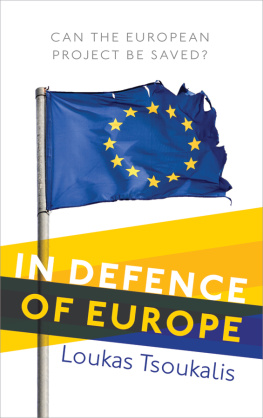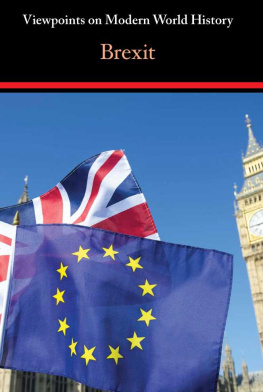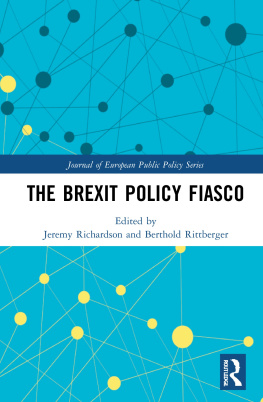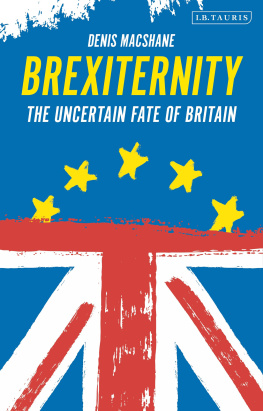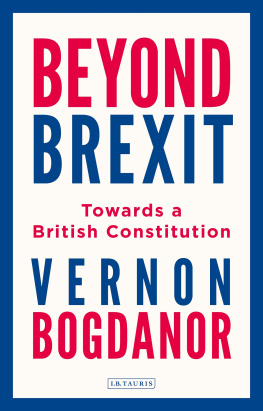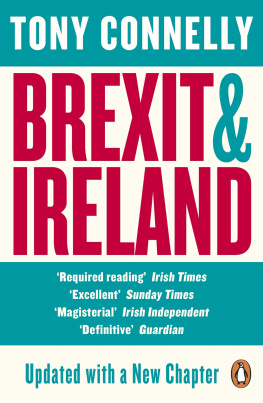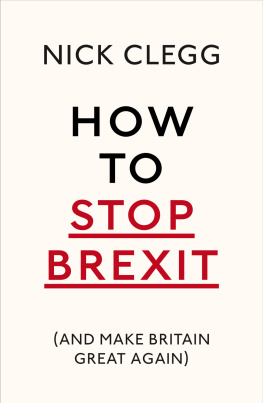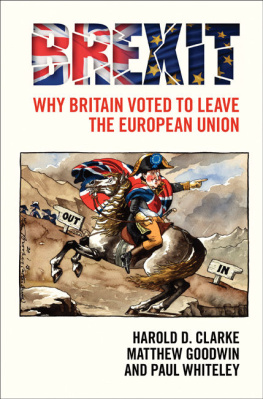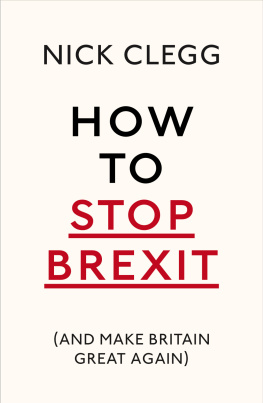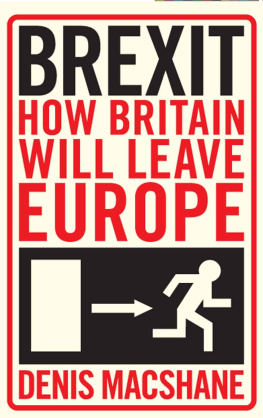DENIS MACSHANE was a Labour MP serving in Tony Blairs government as Minister for Europe. He was first elected as MP for Rotherham in 1994 and served until his resignation in 2012. MacShane studied at Oxford and London Universities and has four children. He is a prominent commentator on European issues.
___________________________
The UKs Brexit vote in 2016 and the inconclusive general election just 12 months later have unleashed a wave of chaos and uncertainty on the eve of formal negotiations with the EU.
Denis MacShane former MP and Europe minister under Tony Blair has a unique insider perspective on the events that led to the Brexit vote and ultimately to Theresa Mays ill-fated election gamble of June 2017.
He argues that Brexit will not mean full rupture with Europe and that British business will overcome the rightwing forces of the Conservative back-benches and UKIP, which have already been weakened by the latest election. Although negotiations with the EU may prove excruciating, Britain cannot and will not divorce itself from the continent of Europe. Indeed, the European question will remain the defining political issue of our time.
As a multi-lingual citizen of the EU with unique access to key Brexit negotiators, Denis MacShane is an acute observer of post-referendum politics. He predicted the Leave vote back in January 2015. His superbly argued case against the fatalism of defeated Remainers, and the cynical financial interests behind the Leave campaign demands the widest possible readership.
Ian McEwan
Denis MacShane, the former Minister of Europe, is almost unique among British commentators on the EU in spending more time in European capitals than in London. He therefore enjoys an extraordinarily rich network of European political contacts, which allows him great insight into how the EU and its member-states are changing. In January 2015 MacShane correctly predicted that Brexit would happen, and anyone interested in the next stages of the Brexit saga would be well advised to read this book.
Charles Grant, Centre for European Reform
Britain has been involved in European affairs for centuries to ensure the UKs security and economic health. Now Britain is set to leave the European Union. But is the narrow vote in the referendum on June 2016 the last and only word on Britains future relationship with the continent and what does it mean for the future of the unity of the United Kingdom? Denis MacShane was a UK politician with one of the widest network of friends and contacts in many EU capitals. Remarkably, he predicted the referendum outcome in his book Brexit: How Britain Will Leave Europe in January 2015. Now he argues that Britain can and must remain part of Europe. Everyone involved in the Europe debate, whether or not they agree with the author, will find plenty of facts and arguments in this book relevant to this next chapter in our islands history.
Brendan Simms, Director of the Forum on Geopolitics, Cambridge and co-author of Donald Trump: The Making of a World View
The question of Brexit is set to dominate British political life for the foreseeable future. There has never been anything like it before. A closely fought referendum with a narrow outcome leading to a decision to leave the European Union, as well as the end of a prime ministers career and the arrival of the second female prime minister in British history. Now the fraught and difficult negotiations are under way. Denis MacShane has been one of the most passionate pro-Europeans in Parliament and Government and today still networks across Europe, speaking and writing in more than one language on the future of the EU and about Brexit. Leavers and Remainers will find plenty in his new book to agree and disagree with. It reflects the pro-European commitment of Denis MacShane but adds facts and arguments, especially from across the Channel and Irish Sea, that will interest anyone following this new chapter in our national life.
Adam Boulton
All is not lost. Thats the important message of hope from one of the very few who forecast the referendum result correctly. Brexit is the biggest challenge for Britain in a generation as a hard UKIP-style Brexit would align Britain with Donald Trump and Vladimir Putin, rather than with progressive forces and friends in Europe such as Emmanuel Macron and Angela Merkel. Denis MacShane has the deepest knowledge of Europe, having spent much of his life working with European political and civil society. He has been the most prominent pro-European voice as an MP and Minister. This book exposes the dark forces that won the Brexit vote and how it may be possible to take them on and ensure that British citizens do not lose all rights to trade, work or live in Europe. This is a must-read for those who need encouragement to fight on for Britain's close relationship with the EU.
Polly Toynbee
BREXIT, NO EXIT
WHY (IN THE END) BRITAIN WONT LEAVE EUROPE
DENIS MACSHANE

Published in 2017 by
I.B.Tauris & Co. Ltd
London New York
www.ibtauris.com
Copyright 2017 Denis MacShane
The right of Denis MacShane to be identified as the author of this work has been asserted by the author in accordance with the Copyright, Designs and Patents Act 1988.
All rights reserved. Except for brief quotations in a review, this book, or any part there of, may not be reproduced, stored in or introduced into a retrieval system, or transmitted, in any form or by any means, electronic, mechanical, photocopying, recording or otherwise, without the prior written permission of the publisher.
References to websites were correct at the time of writing.
ISBN: 978 1 78453 878 1
eISBN: 978 1 78672 257 7
ePDF: 978 1 78673 257 6
A full CIP record for this book is available from the British Library
A full CIP record is available from the Library of Congress
Library of Congress Catalog Card Number: available
CONTENTS
PREFACE
This book explains the main reasons why Brexit came about and why the populist plebiscite of 23 June 2016 and the election of 8 June 2017, which saw a major defeat for the pro-Brexit forces in Britain, are not the last word on Britains place in Europe. Indeed, already by spring 2017 opinion polls were showing that a majority of voters now thought the decision to leave Europe was a mistake.
The election of June 2017 was when the 48 per cent of the voters in the country who said No to Brexit twelve months previously, and were then treated with contempt by the Conservative government, took their revenge.
Particularly in London, the candidates who opposed Brexit from Labour and the Liberal Democrats did very well. Remain voters kicked out the pro-Brexit Conservative MP in Kensington and Chelsea, the wealthiest constituency in the country, and previously a sure-fire Conservative seat.
After Emmanuel Macron in France, it was the turn of British voters to astonish themselves and the world with an election result that was unthinkable six months previously.
In 2016 David Cameron believed that his cynical plebiscite on Europe could not be lost. In 2017 Theresa May believed her opportunistic early election would result in Labour being crushed. Never have two British prime ministers shown such lack of judgement in just twelve months.
Theresa May, whose election manifesto was almost a UKIP document in its repudiation of Europe, suffered a humiliating defeat after less than a year in office. Although she did not resign on the spot as David Cameron did after his Brexit referendum defeat the year before, few could see Mrs May staying long in office after voters rejected her policy and her decision to call an opportunistic election.
Next page

